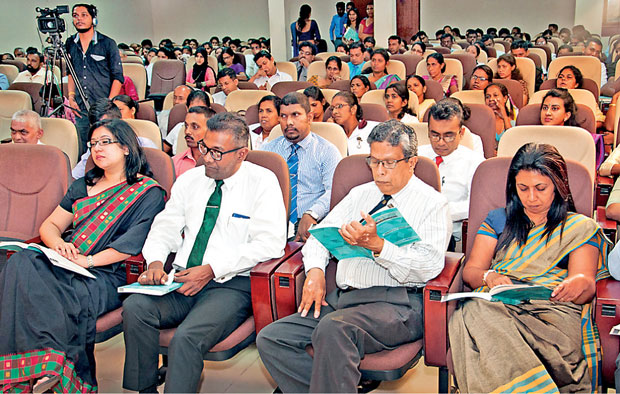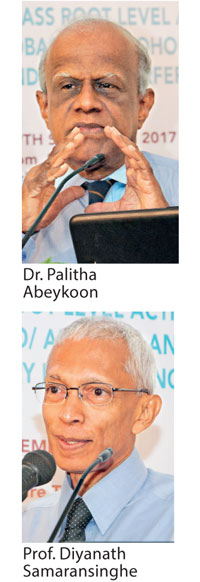Reply To:
Name - Reply Comment

Alcohol and Drug Information Centre (ADIC) and the Centre for Combating Tobacco (CCT), Faculty of Medicine of the University of Colombo jointly organised a symposium on Grassroots Level Actions to Control Tobacco/Alcohol and to Counter Industry Interference last Tuesday (Sept. 19) at the New Building Lecture Theatre, Faculty of Medicine, University of Colombo.
This is the first time that a community symposium was organised on alcohol and tobacco prevention activities in Sri Lanka.
It was an ideal platform to discuss the latest and innovative interventions methodologies carried out by the communities in the field of alcohol and tobacco control within their social milieu.
Professor Jennifer Perera, Dean of Faculty of Medicine delivered the welcome speech and Dr. Mahesh Rajasuriya, Director of CCT and Ms. Hiruni Wijesuriya, Lead Reporter, CCT presented some evidence- based tobacco industry tactics and how such strategies were being unmasked through CCT.

The Chief Guest of the event Dr. Palitha Abeykoon, the Chairman of the National Authority on Tobacco and Alcohol stressed the importance of community and urged everyone to “light small community fires until they became a mass energy that could bring vast changes.”
Dr. Samantha Kumara Kithalawaarachchi, Director of the Presidential Task Force on Drug Prevention expressed how fortunate Sri Lankans were to have a President, who combated alcohol, tobacco and other drugs with true passion and the responsibility of a community to take the maximum benefit under such a leader.
The Director of the Swedish Council for Information on Alcohol and Other drugs Hakan Leaifman taking examples from the Swedish context said that Sri Lanka should pay attention to the new trends of the alcohol industry, such as promoting alcohol consumption to women.
He highlighted that alcohol use and tobacco use were declining in Europe and according to research done there was no trend that people were shifting to other drugs as well.
Prof. Diyanath Samaransinghe, a notable figure in the field of alcohol and tobacco control suggested that there should be a mechanism or a space to measure and appreciates the people who have made even small steps that one has to pass to achieve the ultimate goal of stopping alcohol or tobacco consumption.
He also stated that every person has both good and bad sides; but in different portions and therefore everyone engaged in drug prevention should be skilful to find ways to bring out the goodness in ‘bad’ people.
“In other words (These are) people who act as owners, agents, dealers, employees of alcohol and tobacco industry or people, who support the industry for the sake of money. If we do this, we might be able to witness upright politicians, who work for the happiness and good health of people one day,” he said.
Pubudu Sumanasekara, the Executive Director of ADIC delivered the vote of thanks saying that this symposium filled the gap in the country which lacked opportunities to hear the voice of grassroots level mobilisers in the field of alcohol and tobacco control.
A total of 25 presentations and 57 poster presentations submitted under six themes, which were selected through a committee of professionals in the field were presented by community members from various parts of the country.
“The symposium was a simple reward mechanism that could help to drive the individuals, community groups, community based organisations, activists, students and other stakeholders to continue drug prevention work in their areas.
“It was an ideal platform to discuss the latest and innovative interventions methodologies carried out by the communities in the field of alcohol and tobacco control within their social milieu. The successful stories presented at the symposium would enrich the knowledge and skills and encourage all those who strive to achieve the same goal in their respective societies,” he said.